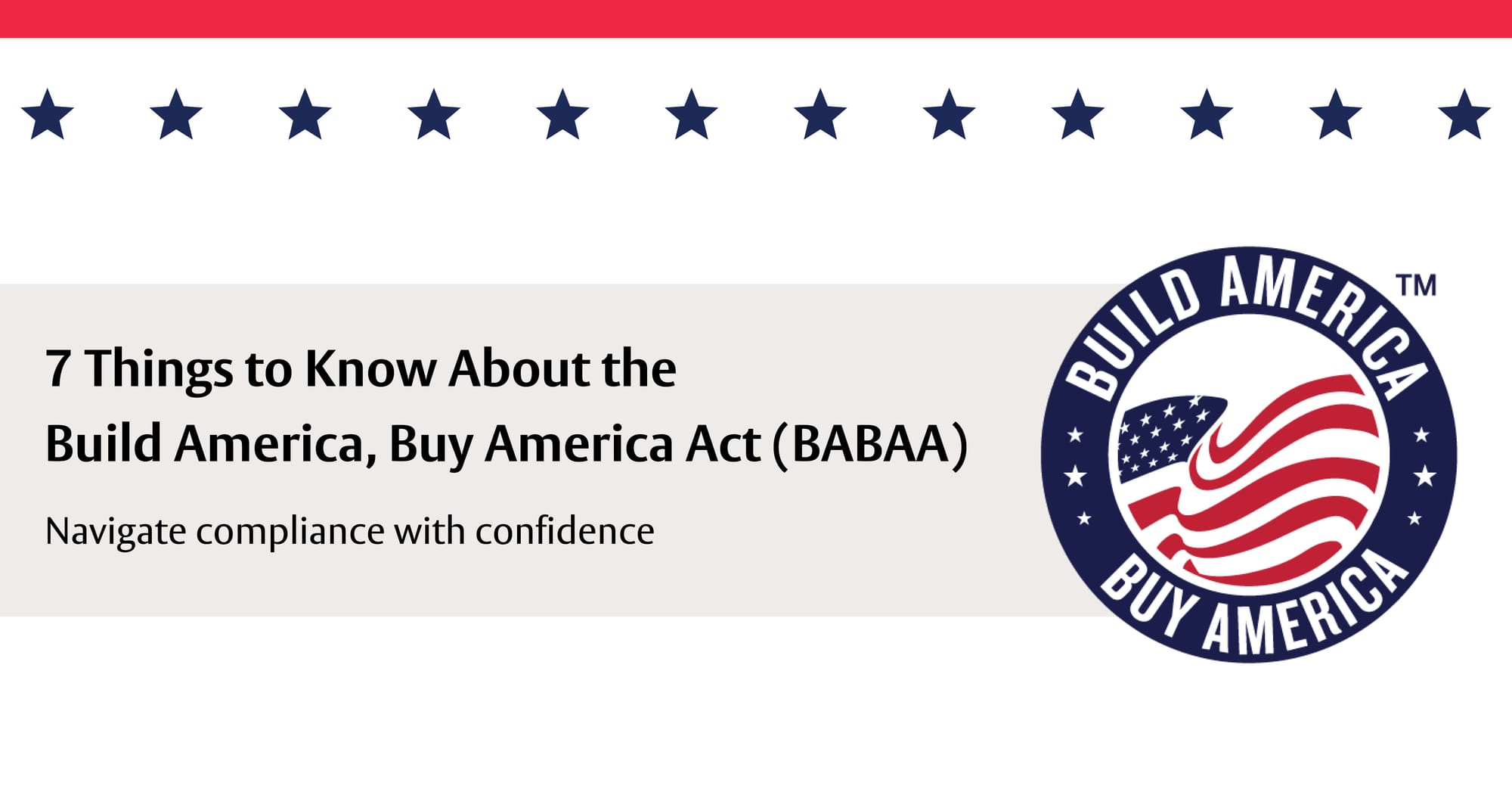7 Things to Know About the Build America, Buy America Act (BABAA)
Looking to understand the ins and outs of the Build America, Buy America Act? Our experts at SARGENT and Corbin Russwin share answers to the most common questions we hear from customers.

Looking to understand the ins and outs of the Build America, Buy America Act (BABAA) and its impact on your daily business? This regulation passed in conjunction with the Infrastructure & Investment & Jobs Act (IIJA) in November 2021 and went into effect for all federal financial assistance granted on infrastructure projects. This places significant responsibility on American businesses to understand when and if the products they supply meet this new threshold of domestic sourcing, ensuring compliance. Our experts at SARGENT and Corbin Russwin share answers to the most common questions we hear from customers.1
1) What is the purpose of BABAA?
BABAA aims to prioritize domestic manufacturing and procurement for infrastructure projects funded by federal financial assistance. Its primary goal is to support U.S. industry, boost job creation, and strengthen the nation's supply chains by reducing reliance on foreign manufacturers. This is achieved by mandating that iron, steel, manufactured products, and construction materials used in federally funded infrastructure projects must be produced in the United States.1
2) What counts as infrastructure?
Infrastructure, as defined under the IIJA, is a broad category that spans conventional projects from highways and bridges to schools and parks. It applies to multiagency assets like airports, ports, harbors, and railroads. Utilities like energy and water, including broadband, are relevant as well.1, 2
BABAA has a sizeable impact on projects in most communities and municipalities nationwide and is now being implemented within many federal agencies. For example, the U.S. Department of Transportation’s Federal Highway Administration (FHWA) has recently adopted similar BABAA language, indicating wider adoption going forward.3
BABAA is a separate regulation from the Buy American Act (BAA). Learn more about regulations impacting domestic sourcing and procurement on our {BABAA}
3) Where can I learn more about BABAA and its applicability and implementation requirements?
The Executive Branch’s Office of Management & Budget issued OMB 24-02 Memorandum Implementation Guidance on Application of Buy America Preference in Federal Financial Assistance Programs for Infrastructure in October 2023 which provides more detailed implementation guidance.2
4) What materials and products does BABAA cover?
BABAA covers all iron and steel, manufactured products and construction materials. This includes all types of iron & steel content products used on these projects, not just steel structures and beams.
For metal processing in particular, it’s important to note that BABAA addresses all stages of the manufacturing, to include initial smelting or melting, shaping, coatings, finishes, and even final assembly.
5) How are door hardware industry products determined to meet BABAA?
Within the commercial door hardware industry, it is presumed that most products are classified as “predominately iron and steel” and are therefore subject to the mandate that says 100% of the steel content be U.S. sourced. This would include metal doors and frames, as well as hardware like locksets, pulls, exit devices, hinges, door stops, closers, levers, and door pulls. If these products are determined to NOT be “predominately iron and steel,” they are assessed against a secondary threshold for products “that are mined, produced, or manufactured in the United States” and the total cost of all components of the manufactured product must be greater than 55% domestic.2
6) How is compliance measured or certified?
Unlike an environmental product declaration (EPD) or a third-party certification like ISO or UL, there is currently no industry label that validates a product as BABAA, or BAA/TAA, compliant. Manufacturers are legally responsible for calculating the component costs and documenting how materials are sourced domestically, so internal audits and due diligence are important to maintain compliance.
ASSA ABLOY’s Government Compliance, product managers, and supply chain teams work closely to assess and validate our product lines and maintain detailed records on our compliance status. For a more detailed assessment of your project’s needs, please contact our team of experts by filling out the form at the bottom of this article.
7) What is the risk/impact of BABAA on manufacturers and distributor partners?
In the short time BABAA has been in effect, its influence on construction projects of all types has been far-reaching. Whether you are an owner, designer, builder, manufacturer, or supplier, all parties must ensure that products comply with BABAA requirements. For the most part, manufacturers should be aware of the differences in these regulations and have taken steps to assess accordingly. As a distributor, it’s important that your teams are fully knowledgeable in the differences between these regulations and to confirm that your manufacturing partners are providing concise, legally supportable answers on the products’ compliance throughout the supply chain. Details matter due to the ambiguities in these similar, but different regulations.
ASSA ABLOY Opening Solutions is proud to offer a suite of hardware solutions that meet BABAA as well as other common regulations such as BAA/TAA and NDAA 889. Qualifying products vary by regulation. Get in touch with our team of experts to learn more about the suite of BABAA-compliant products available from X that protect American infrastructure and streamline project approval.
References
1. H.R.3684 - Infrastructure Investment and Jobs Act: https://www.congress.gov/bill/117th-congress/house-bill/3684/text
2. OMB 24-02 Implementation Guidance https://www.whitehouse.gov/wp-content/uploads/2023/10/M-24-02-Buy-America-Implementation-Guidance-Update.pdf
3. FHWA Announces Updates to Buy America Requirements to Promote Domestic Manufacturing in Transportation Projects, United States Department of Transportation: https://highways.dot.gov/newsroom/fhwa-announces-updates-buy-america-requirements-promote-domestic-manufacturing
4. The Made in America Office provides extensive information relevant to BABAA and other domestic sourcing topics: https://www.madeinamerica.gov/